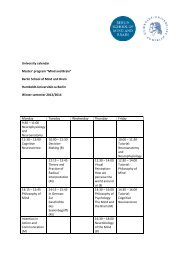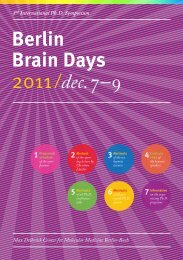Download - Berlin School of Mind and Brain
Download - Berlin School of Mind and Brain
Download - Berlin School of Mind and Brain
Create successful ePaper yourself
Turn your PDF publications into a flip-book with our unique Google optimized e-Paper software.
Vera Ludwig<br />
Hypnosis <strong>and</strong> Neuroscience<br />
Hypnosis can influence perception, behaviour, <strong>and</strong> cognition in healthy people. For<br />
example, susceptible individuals may temporarily experience their own movements as<br />
produced by an external source, they may have hallucinations, or they may report a<br />
complete absence <strong>of</strong> pain. Such effects make hypnosis a potentially powerful tool for<br />
cognitive neuroscience; <strong>and</strong> indeed, this method is increasingly being used in<br />
neuroimaging studies. I will explain what hypnosis can do for mind-<strong>and</strong>-brain research by<br />
showing how it has helped to elucidate the neural basis <strong>of</strong> certain subjective phenomena<br />
(e.g., pain, feeling <strong>of</strong> agency). However, I will also consider the limitations <strong>and</strong> challenges<br />
<strong>of</strong> research using hypnosis – in particular, the possibility that hypnotized participants are<br />
merely role-playing. After the presentation, we will discuss to what extent <strong>and</strong> in which<br />
cases hypnosis can be a useful research tool.<br />
19





